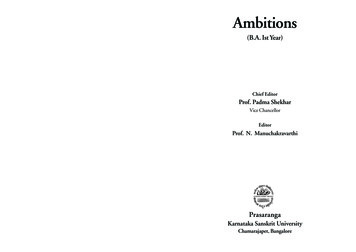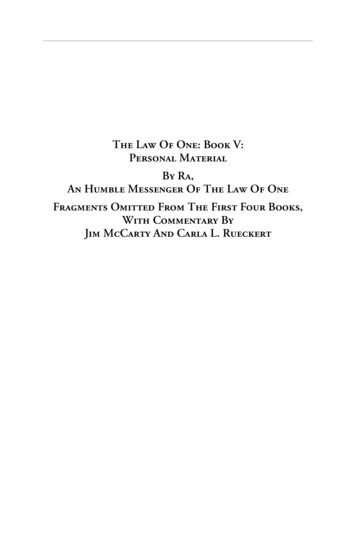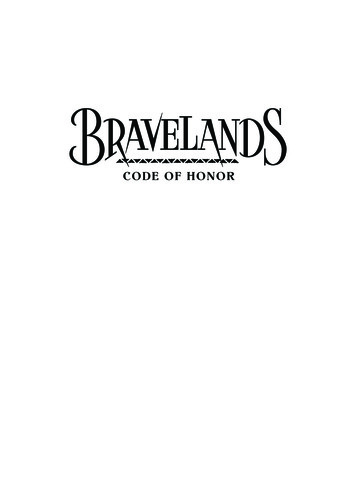
Transcription
AmbitionsAmbitions(B.A. Ist Year)Chief EditorProf. Padma ShekharVice ChancellorEditorProf. N. ManuchakravarthiPrasarangaKarnataka Sanskrit UniversityChamarajapet, Bangalore1
2AMBITIONS : Text book for B.A. Ist year English, KarnatakaAmbitionsSamskrit University - Published by Prasaranga, Karnataka SamskritUniversity, Pampa Mahakavi Road, Chamarajapet, Bangalore - 560018Email : Karnatakasanskrituniversity@gmail.com,Website : www.ksu.ac.inAmbitions3PrefaceFirst Print : 2018Copies :Pages : 110Price :/- ReservedCover Design :Type Setting : Sampada Publications, BangalorePrinted at :Language learning and study of literature are two facets oflearning which should be embedded in the system of education.Without a study of literature, language learning is incomplete.Hence, a study of some of the representative pieces of poetry, prose,short stories, critical appreciations and others needs to be undertaken.Karnataka Samskrit University imparts specialized Samskriteducation. However, this does not happen in isolation. Study ofKannada and English literature is also prescribed in undergraduatecourses. Hence, there was an urgent need of a textbook, whichtakes into account various dimensions of English literature. It is amatter of pride and pleasure that Karnataka Samskrit University isbringing out this text-book of English with this view.The present text-book comprises of many good literary works,which when studied and mastered, make a student appreciateEnglish literature and language. Book One comprises of short proseand poetry, both by Indian and Western authors. Older forms ofpoetry like sonnets are also introduced to the student in this book.Book Two comprises of about ten chapters. ‘Shooting an Elephant’and etc. are essays which develop critical and logical thinking.Thestudent is exposed to different styles of English prose. Satirical andcomedy pieces followed by critical essays, poetry etc. are introducedin a novel way. There are special exercises on Functional Grammarand grammatical elements.I congratulate the Editorial board for bringing out these twovolumes which are most needed to students. I thank noted critiqueDr. N. Manu Chakravarty who has edited these volumes. I offer
4Ambitionsmy thanks to Dr. Vinay P. for assistance in editing. Dr.Veeranarayana N.K. Pandurangi, Director of Adhyayananga tookpains in arranging the compilation and printing of these volumes.I thank all the persons who worked for this book.The choice of literary material is also most praise-worthy. Iwish that these books help instil an appreciation for English literatureand also produce interest for further study.Prof. Padma ShekharVice-ChancellorKarnataka Samskrit UniversityBangaloreAmbitions5Contents1. On Ahimsaby M.K. Gandhi72. The Kabuliwallahby Rabindranath Tagore143. ‘ Javni’by Raja Rao264. Toba Tek Singhby Sadat Hasan Manto485. "The Bet"by Anton Chekhov576. The Tragedy of Julius Caesarby William Shakespeare687. A Poison Treeby William Blake978. A Slumber did my Spirit Sealby William Wordsworth1019. On his blindnessby John Milton10310. Sonnet 116: Let me not to the marriage of true mindsby William Shakespeare106Functional Grammar108
6AmbitionsAmbitions7Editorial BoardOn AhimsaChief EditorProf. Padma ShekarVice ChancellorEditorDr. N. ManuchakravarthiMembersProf. V GirischandraDr. V. PandurangiDr. Vinay P.Printing Co-ordinatorsDr. Santhosh S. HangalDr. B. GovindaSummaryIn 1916, Mohandas Karamchand Gandhi and Lala Lajpat Rai,who had not yet become a fervid adherent of the policy of nonviolence, were debating the principles of ahimsa. That year, morethan a decade before Rai led a peaceful protest in Lahore against theSimon Commission, he took issue with one of the speeches givenby Gandhi, who had recently returned home from South Africa.In an article that was published in July 1916, Rai wrote thatthe elevation of ahimsa to the highest doctrine had led to thedownfall of India. This article was published in the Modern Review,a Calcutta-based journal of opinion that was founded by the Bengalithinker and reformist Ramananda Chatterjee in 1907. The historianRamchandra Guha has described the Modern Review as "the firstIndian equivalent of Les Temps Moderne, the New Statesman andThe Nation." The journal-which emerged as a vital platform fordebates on nationalism, history and society-counted among itscontributors Rabindranath Tagore, Jawaharlal Nehru, SubhashChandra Bose, Premchand, Verrier Elwin, Rajkumari Amrit Kaurand CF Andrews.Patriots, Poets and Prisoners, an anthology of essays publishedin the Modern Review from 1906 to 1947, captures some of thedebates surrounding the nationalist movement. In this excerpt,
8AmbitionsGandhi responds to Rai's critique, reminding us of the evils ofviolence, noting that one's "love of the cow or the country is avague thing intended to satisfy one's vanity or soothe a stingingconscience."(Courtesy: ed-non-violence-lala-lajpat-rai)About the AuthorMohandas Karamchand Gandhi (2 October 1869 - 30 January1948) was the leader of the Indian independence movement againstBritish rule. Employing nonviolent civil disobedience, Gandhi ledIndia to independence and inspired movements for civil rights andfreedom across the world. The honorific Mahatma (Sanskrit: "highsouled", "venerable")-applied to him first in 1914 in South Africais now used worldwide. In India, he is also called Bapu (Gujarati:endearment for father, papa) and Gandhiji. He is unofficially calledthe Father of the Nation.Born and raised in a Hindu merchant family in coastal Gujarat,India, and trained in law at the Inner Temple, London, Gandhifirst employed nonviolent civil disobedience as an expatriate lawyerin South Africa, in the resident Indian community's struggle forcivil rights. After his return to India in 1915, he set about organisingpeasants, farmers, and urban labourers to protest against excessiveland-tax and discrimination. Assuming leadership of the IndianNational Congress in 1921, Gandhi led nationwide campaigns forvarious social causes and for achieving Swaraj or self-rule.Gandhi famously led Indians in challenging the Britishimposed salt tax with the 400 km (250 mi) Dandi Salt March in1930, and later in calling for the British to Quit India in 1942. Hewas imprisoned for many years, upon many occasions, in bothAmbitions9South Africa and India. He lived modestly in a self-sufficientresidential community and wore the traditional Indian dhoti andshawl, woven with yarn hand-spun on a charkha. He ate simplevegetarian food, and also undertook long fasts as a means of bothself-purification and political protest.Gandhi's vision of an independent India based on religiouspluralism, however, was challenged in the early 1940s by a newMuslim nationalism which was demanding a separate Muslimhomeland carved out of India. Eventually, in August 1947, Britaingranted independence, but the British Indian Empire waspartitioned into two dominions, a Hindu-majority India andMuslim-majority Pakistan. As many displaced Hindus, Muslims,and Sikhs made their way to their new lands, communal violencebroke out, especially in the Punjab and Bengal. Eschewing theofficial celebration of independence in Delhi, Gandhi visited theaffected areas, attempting to provide solace. In the monthsfollowing, he undertook several fasts unto death to stop communalviolence. The last of these, undertaken on 12 January 1948 whenhe was 78, also had the indirect goal of pressuring India to pay outsome cash assets owed to Pakistan. Some Indians thought Gandhiwas too accommodating. Among them was Nathuram Godse, whoassassinated Gandhi on 30 January 1948 by firing three bulletsinto his chest. Captured along with many of his co-conspiratorsand collaborators, Godse and his co-conspirator Narayan Apte weretried, convicted and executed while many of their other accompliceswere awarded prison sentences.Gandhi's birthday, 2 October, is commemorated in India asGandhi Jayanti, a national holiday, and worldwide as theInternational Day of Nonviolence.Courtesy: Wikipedia
10AmbitionsOn AhimsaHad Lala Lajpat Rai first ascertained what I had actually saidon ahimsa, his remarks in The Modern Review for last July wouldnot have seen the light of day. Lala-ji rightly questioned whether Iactually made the statements imputed to me. He says, that if I didnot, I should have contradicted them. In the first place, I have notyet seen the papers which have reported the remarks in question orthose wherein my remarks were criticised. Secondly, I must confessthat I would not undertake to correct all the errors that creep intoreports that appear in the public press about my speeches.Lala-ji's article has been much quoted in the Gujaratinewspapers and magazines; and it is perhaps as well for me to explainmy position. With due deference to Lala-ji, I must join issue withhim when he says that the elevation of the doctrine of ahimsa tothe highest position contributed to the downfall of India. Thereseems to be no historical warrant for the belief that an exaggeratedpractice of ahimsa synchronised with our becoming bereft of manyvirtues. During the past fifteen hundred years, we have as a nationgiven ample proof of physical courage, but we have been torn byinternal dissensions and have been dominated by love of self insteadof love of country. We have, that is to say, been swayed by thespirit of irreligion rather than of religion.I do not know how far the charge of unmanliness can be madegood against the Jains. I hold no brief for them. By birth I am aVaishnavite, and was taught ahimsa in my childhood. I have derivedmuch religious benefit from Jain religious works, as I have fromscriptures of the other great faiths of the world. I owe much to theliving company of the deceased philosopher Raja Chand Kavi whowas a Jain by birth. Thus though my views on ahimsa are a resultof my study of most of the faiths of the world, they are now nolonger dependent upon the authority of these works. They are aAmbitions11part of my life and if I suddenly discovered that the religious booksread by me bore a different interpretation from the one I had learntto give them, I should still hold to the view of ahimsa as I amabout to set forth here. Our shastras seem to teach that a man whoreally practises ahimsa in its fullness has the world at his feet, he soaffects his surroundings that even the snakes and other venomousreptiles do him no harm. This is said to have been the experience ofSaint Francis of Assisi.In its negative form, it means not injuring any living being,whether by body or mind. I may not therefore hurt the person ofany wrongdoer, or bear any ill will to him and so cause him mentalsuffering. This statement does not cover suffering caused to thewrong-doer by natural acts of mine which do not proceed from illwill. It, therefore, does not prevent me from withdrawing fromhis presence a child whom he, we shall imagine, is about to strike.Indeed the proper practice of ahimsa required me to withdraw theintended victim from the wrong-doer, if I am in any way whatsoeverthe guardian of such a child. It was therefore most proper for thepassive resisters of South Africa to have resisted the evil that theUnion Government sought to do to them. They bore no ill will toit. They showed this by helping the Government whenever it neededtheir help.Their resistance consisted of disobedience of the orders of theGovernment, even to the extent of suffering death at their hands.Ahimsa requires deliberate self-suffering, not a deliberate injuringof the supposed wrong-doer.In its positive form, ahimsa means the largest love, the greatestcharity. If I am a follower of ahimsa, I must love my enemy. I mustapply the same rule to the wrong-doer who is my enemy or astranger to me, as I would to my wrong-doing father or son. Thisactive ahimsa necessarily includes truth and fearlessness. A mancannot deceive the loved ones; he does not fear or frighten him orher.
12Ambitions(Gift of life) is the greatest of all gifts. A man who gives it inreality disarms all hostility. He has paved the way for an honourableunderstanding. And none who is himself subject to fear can bestowthat gift. He must therefore be himself fearless. A man cannot thenpractise ahimsa and be a coward at the same time. The practice ofahimsa calls forth the greatest courage. It is the most soldierly of asoldier's virtues. General Gordon has been represented in a famousstatue as bearing only a stick. This takes us far on the road to ahimsa.But a soldier, who needs the protection of even a stick, is tothat extent so much the less a soldier. He is the true soldier whoknows how to die and stand his ground in the midst of a hail ofbullets. Such a one was Ambarish who stood his ground withoutlifting a finger, though Durvasa did his worst. The Moors, whowere being powdered by the French gunners, rushed into the guns'mouth with 'Allah' on their lips, showed much the same type ofcourage. Only theirs was the courage of desperation. Ambarish'swas due to love. Yet the Moorish valour, readiness to die, conqueredthe gunners. They frantically waved their hats, ceased firing andgreeted their erstwhile enemies as comrades. And so the SouthAfrican passive resisters in their thousands were ready to die ratherthan sell their honour for a little personal ease. This was ahimsa inits active form. It never barters away honour. A helpless girl in thehands of a follower of ahimsa finds better and surer protectionthan in the hands of one who is prepared to defend her only to thepoint to which his weapons would carry him.The tyrant, in the first instance, will have to walk to his victimover the dead body of her defender, in the second, he has but tooverpower the defender, for it is assumed that the canon of proprietyin the second instance will be satisfied when the defender has foughtto the extent of his physical valour. In the first instance, as thedefender has matched his very soul against the mere body of thetyrant, the odds are that the soul in the latter will be awakened, andAmbitions13the girl will stand an infinitely greater chance of her honour beingprotected than in any other conceivable circumstance - barring, ofcourse, that of her own personal courage.If we are unmanly today, we are so, not because we do notknow how to strike, but because we fear to die. He is no followerof Mahavira, the apostle of Jainism, or of Buddha or of the Vedas,who being afraid to die, takes flight before any danger, real orimaginary all the while wishing that somebody else would removethe danger by destroying the person causing it. He is no followerof ahimsa (I agree with Lala-ji) who does not care a straw if he killsa man by inches by deceiving him in trade, or who will protect byforce of arms a few cows and make away with the butcher, or whoin order to do a supposed good to his country does not mind killingoff a few officials.All these are actuated by hatred, cowardice and fear. Her loveof the cow or the country is a vague thing intended to satisfy one'svanity or soothe a stinging conscience. Ahimsa, truly understood,is, in my humble opinion, a panacea for all evils mundane andextra-mundane. We can never overdo it. Just at present, we are notdoing it at all. Ahimsa does not displace the practice of other virtues,but renders their practice imperatively necessary before it can bepracticed even in its rudiments. Lala-ji need not fear the ahimsa ofhis father's faith. Mahavira and Buddha were soldiers, and so wasTolstoy. Only they saw deeper and truer in their profession, andfound the secret of a true, happy, honourable and godly life. Let usbe joint sharers with these teachers and this land of ours will oncemore be the abode of gods.Excerpted from Patriots, Poets and Prisoners: Selections fromRamananda Chatterjee's The Modern Review, 1907-1947,published by Harper Collins India.
14AmbitionsThe KabuliwallahSummary:The Kabuliwallah is from Kabul. His real name is AbdurRahman. He works as a peddler in India. He goes to Kabul once ayear to visit his wife and little daughter. In the course of sellinggoods, once he reaches the house of the writer, Rabindranath Tagore.Then his Five year old daughter, Mini calls him 'Kabuliwallah! AKabuliwallah'. When Kabuliwallah goes to visit Mini she is afraidbecause he is wearing loose soiled clothes and a tall turban. Helooks gigantic. When the writer knows that Mini is afraid, heintroduces her to him. The Kabuliwallah gives her some nuts andraisins. Mini is happy and from the next day, the Kabuliwallahoften visits her and he gives her something to eat. They crack jokesand laugh and enjoy themselves. They also feel comfortable in thecompany of each other. The writer likes their friendship. But Mini'smother doesn't like it. She thinks that a peddler like Kabuliwallahcan be a child lifter. However, Mini and the Kabuliwallah becomeintimate friends.The Kabuliwallah sells seasonal goods. Once he sells a Rampurishawl to a customer on credit. He asks him for the money manytimes but he doesn't pay. At last he denies buying the shawl. TheKabuliwallah becomes very angry and stabs the customer. He isarrested by the police and taken to jail. He is jailed for eight years.Ambitions15When he is freed from jail the first thing he does is he goes to visitMini. It is her wedding day and he isn't allowed to visit her. Whenhe shows a piece of paper to the writer, he permits him to meetMini who is in her wedding dress. The writer knows that theKabuliwallah has no money to go back to his house so the writercurtails the wedding expenses and gives one hundred rupees to theKabuliwallah and sends him back to Kabul.Courtesy: he-cabuliwallah-summary-analysis/About the AuthorRabindranath Tagore also written Ravindranatha Thakura (7May 1861 - 7 August 1941), sobriquet Gurudev, was a Bengalipolymath who reshaped Bengali literature and music, as well asIndian art with Contextual Modernism in the late 19th and early20th centuries. Author of Gitanjali and its "profoundly sensitive,fresh and beautiful verse", he became in 1913 the first non-Europeanto win the Nobel Prize in Literature. Tagore's poetic songs wereviewed as spiritual and mercurial; however, his "elegant prose andmagical poetry" remain largely unknown outside Bengal. He issometimes referred to as "the Bard of Bengal".A Pirali Brahmin from Calcutta with ancestral gentry roots inJessore, Tagore wrote poetry as an eight-year-old. At the age ofsixteen, he released his first substantial poems under the pseudonymBhanusimha ("Sun Lion"), which were seized upon by literaryauthorities as long-lost classics. By 1877 he graduated to his firstshort stories and dramas, published under his real name. As ahumanist, universalist, internationalist, and ardent nationalist, hedenounced the British Raj and advocated independence fromBritain. As an exponent of the Bengal Renaissance, he advanced avast canon that comprised paintings, sketches and doodles, hundreds
16Ambitionsof texts, and some two thousand songs; his legacy also endures inthe institution he founded, Visva-Bharati University.Tagore modernised Bengali art by spurning rigid classical formsand resisting linguistic strictures. His novels, stories, songs, dancedramas, and essays spoke on topics political and personal. Gitanjali(Song Offerings), Gora (Fair-Faced) and Ghare-Baire (The Homeand the World) are his best-known works, and his verse, short stories,and novels were acclaimed-or panned-for their lyricism,colloquialism, naturalism, and unnatural contemplation. Hiscompositions were chosen by two nations as national anthems:India's Jana Gana Mana and Bangladesh's Amar Shonar Bangla.The Sri Lankan national anthem was inspired by his work.Courtesy: WikipediaThe KabuliwallahRabindranath TagoreMy five-year-old daughter Mini cannot live withoutchattering. I really believe that in all her life she has not wasted aminute in silence. Her mother is often vexed at this, and wouldlike to stop her prattle, but I would not. For Mini to be quiet isunnatural, and I cannot bear it long. And so my own talk with heris always lively.One morning, for instance, when I was in the midst of theseventeenth chapter of my new novel, my little Mini stole into theroom, and putting her hand into mine, said: "Father! Ramdayal,the door-keeper, calls a kak a kauwa!He doesn't know anything, does he?"Before I could explain to her the difference between onelanguage and another in this world, she had embarked on the fullAmbitions17tide of another subject. "What do you think, Father? Bhola saysthere is an elephant in the clouds, blowing water out of his trunk,and that is why it rains!"And then, darting off anew, while I sat still, trying to think ofsome reply to this: "Father! what relation is mother to you?"With a grave face I contrived to say: "Go and play with Bhola,Mini! I am busy!"The window of my room overlooks the road. The child hadseated herself at my feet near my table, and was playing softly,drumming on her knees. I was hard at work on my seventeenthchapter, in which Pratap Singh, the hero, has just caughtKanchanlata, the heroine, in his arms, and is about to escape withher by the third storey window of the castle, when suddenly Minileft her play, and ran to the window, crying: "A Kabuliwallah! AKabuliwallah!' And indeed, in the street below, there was aKabuliwallah, walking slowly along. He wore the loose, soiledclothing of his people, and a tall turban; he carried a bag on hisback, and boxes of grapes in his hand.I cannot tell what my daughter's feelings were when she sawthis man, but she began to call him loudly. "Ah!" thought I, "hewill come in, and my seventeenth chapter will never be finished!"At that very moment the Kabuliwallah turned, and looked up atthe child. When she saw this, she was overcome by terror, andrunning to her mother's protection disappeared. She had a blindbelief that inside the bag, which the big man carried, there wereperhaps two or three other children like herself. The peddlermeanwhile entered my doorway and greeted me with a smile.So precarious was the position of my hero and my heroine,that my first impulse was to stop and buy something, since Minihad called the man to the house. I made some small purchases, andwe began to talk about Abdur Rahman, the Russians, the English,and the Frontier Policy.
18AmbitionsAmbitions19As he was about to leave, he asked: "And where is the littlegirl, Sir?"a judicious bribe of nuts and almonds, and the two were now greatfriends.And then, thinking that Mini must get rid of her false fear, Ihad her brought out.They had many quaint jokes, which amused them greatly.Mini would seat herself before him, look down on his giganticframe in all her tiny dignity, and with her face rippling with laughterwould begin: "O Kabuliwallah! Kabuliwallah: What have you gotin your bag?"She stood by my chair, and looked at the Kabuliwallah andhis bag. He offered her nuts and raisins, but she would not betempted, and only clung the closer to me, with all her doubtsincreased.This was their first meeting.A few mornings later, however, as I was leaving the house, Iwas startled to find Mini, seated on a bench near the door, laughingand talking, with the great Kabuliwallah at her feet. In all her life,it appeared, my small daughter had never found so patient a listener,save her father. And already the corner of her little sari was stuffedwith almonds and raisins, the gift of her visitor. "Why did you giveher those?" I said, and taking out an eight-anna piece, I handed it tohim. The man accepted the money without demur, and put it intohis pocket.Alas, on my return, an hour later, I found the unfortunatecoin had made twice its own worth of trouble! For the Kabuliwallahhad given it to Mini, and her mother, catching sight of the brightround object, had pounced on the child with: "Where did you getthat eight-anna piece?""The Kabuliwallah gave it to me!" said Mini cheerfully."The Kabuliwallah gave it to you!" cried her mother greatlyshocked, "O Mini! How could you take it from him?"I entered at the moment, and saving her from impendingdisaster, proceeded to make my own inquiries.It was not the first or the second time, I found, that the twohad met. The Kabuliwallah had overcome the child's first terror byAnd he would reply, in the nasal accent of the mountaineer:"An elephant!" Not much cause for merriment, perhaps: but howthey both enjoyed the fun! And for me, this child's talk with agrown-up man had always in it something strangely fascinating.Then the Kabuliwallah, not to be behindhand, would takehis turn: "Well, little one, and when are you going to your fatherin-law's house?"Now nearly every small Bengali maiden had heard long agoabout her father-in-law's house; but we were a little new-fangled,and had kept these things from our child, so that Mini at thisquestion must have been a trifle bewildered. But she would notshow it, and with ready tact replied: "Are you going there?"Amongst men of the Kabuliwallah's class, however, it is wellknown that the words father-in-law's house have a double meaning.It is a euphemism for jail, the place where we are well cared for, atno expense to ourselves. In this sense would the sturdy peddlertake my daughter's question. "Ah," he would say, shaking his fistat an invisible policeman. "I will thrash my father-in-law!" Hearingthis, and picturing the poor discomfited relative, Mini would gooff into peals of laughter in which her formidable friend wouldjoin.These were autumn mornings, the very time of year whenkings of old went forth to conquest, and I without stirring frommy little corner in Calcutta, would let my mind wander over the
20Ambitionswhole world. At the very name of another country, my heart wouldgo out to it, and at the sight of a foreigner in the streets, I wouldfall to weaving a network of dreams-the mountains, the glens, andthe forests of his distant land, with his cottage in their midst andthe free and independent life, or far away wilds. Perhaps scenes oftravel are conjured up before me and pass and re-pass in myimagination all the more vividly, because I lead an existence so likea vegetable that a call to travel would fall upon me like a thunderbolt. In the presence of this Kabuliwallah, I was immediatelytransported to the foot of arid mountain peaks, with narrow littledefiles twisting in and out amongst their towering heights. I couldsee the string of camels bearing the merchandise, and the companyof turbaned merchants, some carrying their queer old firearms, andsome their spears, journeying downward towards the plains. I couldsee . But at some such point Mini's mother would intervene, andimplore me to "beware of that man."Mini's mother is unfortunately very timid. Whenever she hearsa noise in the street, or sees people coming towards the house, shealways jumps to the conclusion that they are either thieves, ordrunkards, or snakes, or tigers, or malaria, or cockroaches, orcaterpillars. Even after all these years of experience, she is not ableto overcome her terror. So she was full of doubts about theKabuliwallah, and used to beg me to keep a watchful eye on him.If I tried to laugh her fear gently away, she would turn roundseriously, and ask me solemn questions:Were children never kidnapped?Was it not true that there was slavery in Kabul?Was it so very absurd that this big man should be able to carryoff a tiny child?I urged that, though not impossible, it was very improbable.But this was not enough, and her dread persisted. But as it was aAmbitions21very vague dread, it did not seem right to forbid the man the house,and the intimacy went on unchecked.Once a year, in the middle of January, Rahman, theKabuliwallah, used to return to his own country, and as the timeapproached, he would be very busy, going from house to housecollecting his debts. This year, however, he could always find timeto come and see Mini. It might have seemed to a stranger thatthere was some conspiracy between the two, for when he couldnot come in the morning, he would appear in the evening.Even to me it was a little startling now and then suddenly tosurprise this tall, loose-garmented man laden with his bags, in thecorner of a dark room; but when Mini ran in smiling, with her"O Kabuliwallah! Kabuliwallah" and the two friends, so far apartin age, subsided into their old laughter and their old jokes, I feltreassured.One morning, a few days before he had made up his mind togo, I was correcting proof-sheets in my study. The weather waschilly. Through the window the rays of the sun touched my feet,and the slight warmth was very welcome. It was nearly eight o'clock,and early pedestrians were returning home with their heads covered.Suddenly I heard an uproar in the street, and looking out sawRahman being led away bound between two policemen, and behindthem a crowd of inquisitive boys. There were blood-stains on hisclothes, and one of the policemen carried a knife. I hurried out,and stopping them, inquired what it all meant. Partly from one,partly from another, I gathered that a certain neighbour had owedthe peddler something for a Rampuri shawl, but had denied buyingit, and that in the course of the quarrel Rahman had struck him.Now, in his excitement, the prisoner began calling his enemy allsorts of names, when suddenly in a verandah of my house appearedmy little Mini, with her usual exclamation: "O Kabuliwallah!Kabuliwallah!" Rahman's face lighted up as he turned to her. He
22Ambitionshad no bag under his arm today, so that she could not talk aboutthe elephant with him. She therefore at once proceeded to the nextquestion: "Are you going to your father-in-law's house?" Rahmanlaughed and said: "That is just where I am going, little one!" Thenseeing that the reply did not amuse the child, he held up his fetteredhands, "Ah!" he said, "I would have thrashed that old father-inlaw, but my hands are bound
"The Bet" by Anton Chekhov 57 6. The Tragedy of Julius Caesar by William Shakespeare 68 7. A Poison Tree by William Blake 97 8. A Slumber did my Spirit Seal by William Wordsworth 101 9. On his blindness by John Milton 103 10. Sonnet 116: Let me not to the marriage of true minds by William Shakespeare 106 Functional Grammar 108. 6 Ambitions Ambitions 7 On Ahimsa Summary In 1916, Mohandas .










